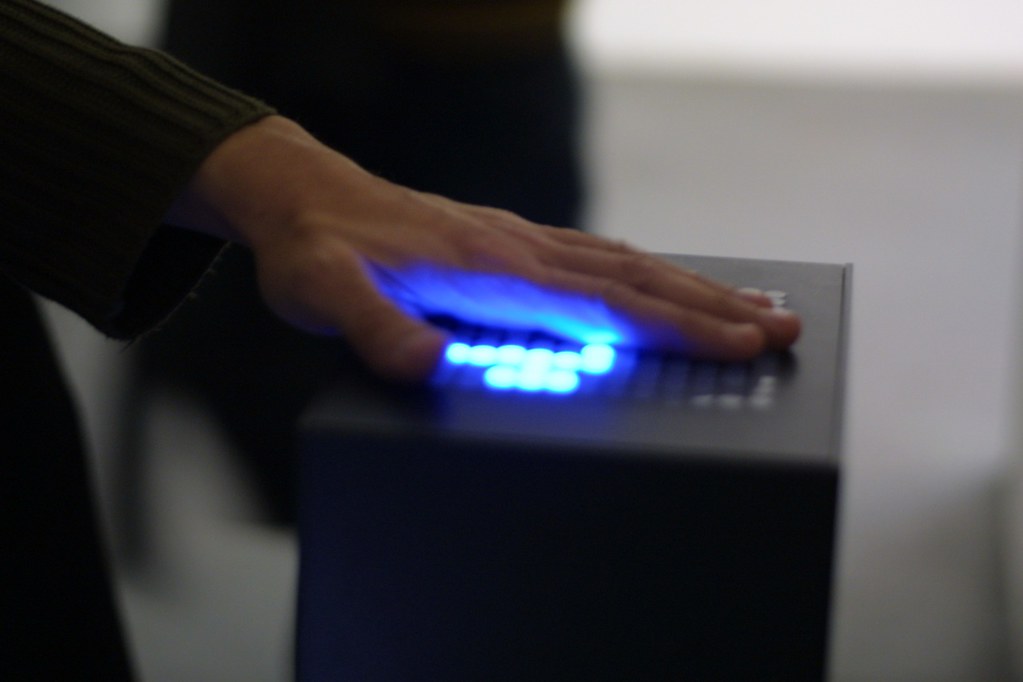In February, team members Raymond Holt, Hassan Dogar and Stuart Murray travelled to Eindhoven and Leiden in The Netherlands to explore collaborations between itDf and academics, disabled designers and technology users who work with haptics. The trip was to discuss the haptic navigation system that is being developed at Leeds as part of the ‘Exploring Human-Robot Futures through Participatory Design’ Work Package, with researchers with Astrid Kappers and Myrthe Plaisier at Eindhoven University of Technology, designer Simon Dogger and technologist and memoirist Femke Krijger.
We spent a day with Astrid and Myrthe in their laboratories at TU/e, testing the Leeds system and engaging with their own haptic work: geometric patterns that users can touch and explore while they rate the ‘pleasantness’, ‘naturalness’ and ‘complexity’ of the experience; drawing and handling experiments that explored the boundaries between touch and recognition; and haptics systems in which users play a game through an app on their phones that asks them to approximate the signals they have received through vibration motors installed in a custom-made chair. After Covid and lockdowns, which made research on haptics all but impossible, it was great to be able to return to the practicalities of touch and tactility.
We visited Simon in his studio (https://www.simondogger.nl/) as he revisited past projects and spoke of his new initiative, Design Beyond Vision, through which he aims to challenge what he calls the ‘inherently visual nature of design’, a position that neglects the place of touch and the tactile in design processes. For Simon, this isn’t simply a question of addressing the design community (he has particular criticisms of design Festivals) but is a set of ideas that best works through education. Education is, Simon says, ‘the source of change’ and he has developed the methodologies in Design Beyond Vision through workshops with Creative Practice students in Eindhoven.
We made plans for Simon to come to the UK to run his product design workshops with students at the University of Leeds and to connect to the Communications Futures package of the itDf team, based at DJCAD in Dundee.
In Leiden, we met with Femke, who wrote about her life as it has been transformed through Usher’s Syndrome in her 2022 memoir De evenswichtskunstenaar (The Balancing Artist). For Femke, creativity drives inclusivity and we spoke about her work as a technologist and educator who wants to develop disability technologies that interact with the body and don’t attempt to compensate for what is presumed to be a lack or an absence. Femke spoke of how she found a ‘richness’ when she trained in Shiatsu massage, a process of connecting with her body that allowed her to ‘find her ground again’ as her vision and hearing decreased.
‘If you’re organised, you can go out in the world’ Femke told us, with organisation here not just the social changes necessary as her condition progresses, but the ways in which she has come to recognise her proprioceptive body awareness through her massage training. Femke spoke of the potential of devising navigation haptics based on shiatsu principles of touch, a wonderful idea that we realised is a literal imagining of a technology for disability futures – our project in action.
A word that emerged across all our conversations in Eindhoven and Leiden was ‘intuitive’. Astrid and Myrthe spoke of the need to make the design of haptic products as intuitive as possible, while Simon and Femke returned to the idea of intuition as they described their way of interacting with their worlds, especially through touch. It was an enlightening message to carry back with us as we continue our design research.

